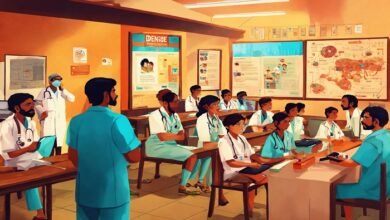The Essential Guide to the MBBS Syllabus: What Every Aspiring Doctor Should Know

Introduction
Embarking on a journey to become a doctor is both challenging and rewarding. The MBBS (Bachelor of Medicine and Bachelor of Surgery) syllabus is meticulously structured to prepare students for a diverse range of medical scenarios. Understanding the MBBS syllabus in detail is crucial for every aspiring doctor, as it lays the foundational knowledge required to excel in the medical field.
Overview of the MBBS Curriculum
The MBBS syllabus is a comprehensive framework designed to provide budding doctors with extensive medical knowledge and practical skills. Typically structured over five to six years, the curriculum includes subjects ranging from Anatomy and Physiology to more advanced topics like Pathology and Pharmacology. The first year focuses on basic sciences, introducing students to the biological and physiological processes that underpin medical sciences.
First Year: Building the Foundations
In the first year of the MBBS syllabus, students delve into the basics of human biology, including Anatomy, Biochemistry, and Physiology. This period is crucial for establishing a strong understanding of the human body’s structure and function, which is essential for all future medical training and practices.
Second Year: Expanding Knowledge
The second year of the MBBS syllabus expands on the foundational knowledge with courses like Microbiology, Pathology, and Pharmacology. These subjects begin to bridge the gap between basic sciences and clinical practice, emphasizing the causes of diseases, their mechanisms, and the basics of medical treatment.
Third Year: Clinical Integration
The third year marks a transition in the MBBS syllabus, focusing more on clinical subjects. Students learn about Preventive Medicine, Forensic Medicine, and ENT. This year is designed to integrate the theoretical knowledge gained in the first two years with practical clinical skills.
Final Years: Specialization and In-depth Study
In the final years, the MBBS syllabus covers specialized subjects such as General Medicine, Surgery, Obstetrics and Gynecology, and Pediatrics. These years are critical for students to apply their knowledge in real-world settings, engaging in hands-on practice and in-depth study of medical specialties.
Practical Training and Internships
A significant component of the MBBS syllabus is the practical training. Internships and residencies are integral, allowing students to gain firsthand experience in hospitals and clinics. This hands-on training is essential for mastering the practical aspects of medicine and surgery.
Examination and Assessment
Examinations in the MBBS syllabus are rigorous and are designed to ensure that students meet the high standards expected of medical professionals. These include both written exams and practical assessments, which test a student’s knowledge and ability to apply it in clinical scenarios.
Skills Development in the MBBS Syllabus
The MBBS syllabus also focuses on developing essential skills such as critical thinking, problem-solving, and effective communication. These skills are vital as they enhance the ability to make informed decisions and work efficiently in fast-paced medical environments.
Technology and Innovation in Medicine
As medical technology advances, the MBBS syllabus continuously integrates new technological advancements. Learning about medical technology, from diagnostic tools to advanced surgical equipment, is increasingly becoming a vital part of medical education.
Preparing for a Medical Career
The MBBS syllabus not only prepares students academically but also equips them with the professional demeanor and ethical understanding required in the medical field. Discussions on medical ethics, patient communication, and the legal aspects of medicine are essential components of the curriculum.
Conclusion
The MBBS syllabus is designed to build highly skilled, knowledgeable, and compassionate doctors. It is an exhaustive educational journey that requires dedication and passion. By thoroughly understanding and engaging with the MBBS syllabus, aspiring medical professionals can ensure they are well-prepared to meet the challenges and demands of a career in medicine.
FAQs
- How long does it take to complete the MBBS syllabus?
- The MBBS course typically spans five to six years, including the mandatory internship period.
- What are the main subjects in the first year of the MBBS syllabus?
- The first year primarily covers Anatomy, Physiology, and Biochemistry.
- Are there any specializations within the MBBS syllabus?
- While the MBBS itself is a general degree, the final years offer more specialized subjects like Surgery, Pediatrics, and Obstetrics.
- How important are internships in the MBBS syllabus?
- Internships are crucial as they provide practical, hands-on experience in various medical settings, which is essential for every aspiring doctor.
- Can students choose elective subjects in the MBBS syllabus?
- Yes, in the later years, students can choose electives based on their interests, which allows for deeper exploration of specialized areas.




